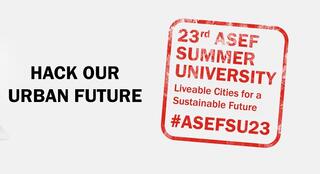The Centre for Sustainable Healthy Learning Cities and Neighbourhoods (SHLC) represented by Professor Michael Osborne and Dr Yulia Nesterova, CR&DALL core members from the School of Education, University of Glasgow, was delighted to be a partner in the 23rd ASEF Summer University (ASEFSU23), an interdisciplinary Hackathon on “Liveable Cities for a Sustainable Future” for Asian and European young professionals & students co-ordinated by the Asia-Europe Foundation.
Implemented as a virtual programme between September and November 2021, this project was designed to connect young hackers, designers, innovators, urban planners and SDG experts to collaborate & develop urban solutions for challenges in three of the most populated countries in ASEM: Bangladesh, India & Pakistan. You can read more about the challenges here.
It aimed to give Youth the opportunity to:
-
Play their role towards Sustainable Urbanisation, transforming their ideas into a concrete solution and leave a positive mark in urban communities in Bangladesh, India & Pakistan
-
Receive intellectual and technical mentorship throughout the programme and solution development
-
Develop their knowledge and skills on the SDGs & Leadership, and receive a certification of participation from renowned universities, as well as microcredits from the University College Cork (UCC), Ireland.
-
Have access to and become a member of the ASEM & ASEF youth community opening doors for cross-regional collaboration and exchange
-
Help represent the youth voice and be part of an ASEM-wide Youth Report on Sustainable Urbanisation
For more details, please refer to the Overview.
The 23rd ASEF Summer University brought together 86 participants and Hackathon Team Leaders from 39 ASEM Countries – you can see more details about them in this Participants Booklet.
The programme was supported by various resource persons: Hackathon Technical Coordinators, Mentors, Speakers, Judges, Background Paper Authors, Young Reporters and an Inclusion Coordinator. You can read about them in this booklet here.
The Summer School consisted of three main programme elements - you can see the full programme here:
Element 1 - Pre-hack Phase (11-29 October 2021): Ideation, including Challenge definition, knowledge building & stakeholder engagement
This phase offered all participants trainings and workshops to deepen their understanding of the theme of Sustainable Cities and Urbanisation, as well as provide them with an outlook on Bangladesh, India and Pakistan. As part of the programme, the participants completed individual & group tasks, and were provided extra resources for self-paced learning using an e-learning platform, including a number of Background Papers on the topics that can be read here.
These include papers attached by Centre for Sustainable Healthy Learning Cities and Neighbourhoods partners on:
- Sustainable Urbanisation in Bangladesh/Dhaka, Prof. Shilpi ROY, Associate Professor, Urban and Rural Planning Discipline, Khulna University, Khulna, Bangladesh;
- Sustainable Urbanisation in India/Delhi, Prof. Debolina KUNDU, Professor, National Institute of Urban Affairs, New Delhi, India and Dr Arvind PANDEY, Assistant Professor at the Tata Institute of Social Sciences, Hyberbad, India;
- Child Obesity in India/Delhi, Prof. Debolina KUNDU, Professor, National Institute of Urban Affairs, New Delhi, India, Rakesh MISHRA Data Analysis Consultant at UNICEF India and Swastika CHAKRAVORTY, Associate Researcher at the National Institute for Urban Affairs in New Delhi and a University of Glasgow colleague;
- Child Obesity in the UK/Glasgow, Dr. Stephanie CHAMBERS, Lecturer, Sociology of Health and Wellbeing, University of Glasgow.
Element 2 - Hackathon (12-14 November 2021): Prototype Development with Experts Mentoring
During this phase, all participants moved from theory to practice, and competed in groups to develop digital prototypes solving specific urban challenges in Bangladesh, India & Pakistan. The participant teams will be supported by intellectual and technical mentors throughout the development process.
On 14 November, the teams all pitched the solutions. You can watch all the Pitches here.
On 15 November, the winners were announced in an Award Ceremony: watch the highlights here.
The following teams won:
-
Bangladesh Challenge: Bangladesh Team 3, led by Ms Samia RAFA
-
India Challenge: India Team 3, led by Ms Neha RANA
-
Pakistan Challenge: Pakistan Team 3, led by Ms Amna SHOAIB
-
Audience Award: Pakistan Team 4, led by Ms Shiza TANWEER
Element 3 - Post-hack (up to 3 months post-Hackathon, only applicable for Hackathon winners): Prototype Testing and possible implementation, including mentoring collaboration with local partners. This is ongoing to outcomes to be announced in due course.
Outcomes and Outputs in Summary
618 Applications were received, 84 Participants aged 18-30 joined, 38 Asian & European Countries were represented and 39 Experts & Resource Persons were engaged. There were 12 Mentors, 4 Technical Coordinators, 15 Speakers, 8 Authors and 7 Asian & European institutions collaborated.
A Micro-credential Programme was developed, nine Background Papers on core topics and a Publication with Participant Essays were published. Additionally, there were six Blogs interviews with partner organisations published, three Information videos, three Highlights videos on challenges, 30 Promotional Video clips on the project & participants and a Podcast series with 11 episodes produced.
There were 18,566 views at the ASEF Website, 252,328 Social media engagements and a Social media reach of 4,144,733.
Discussion topics:
- Log in to post comments












Latest Comments